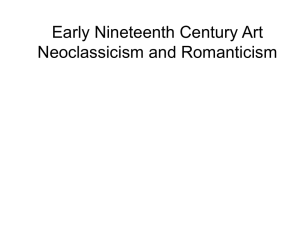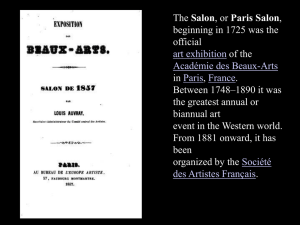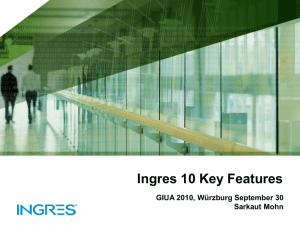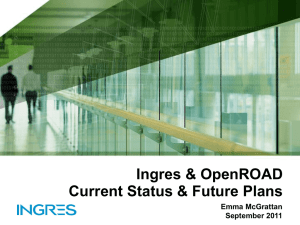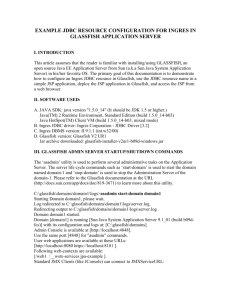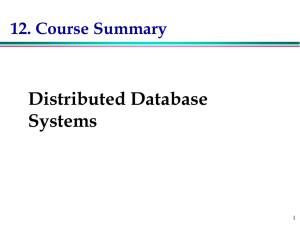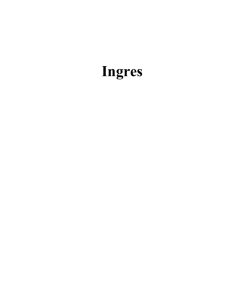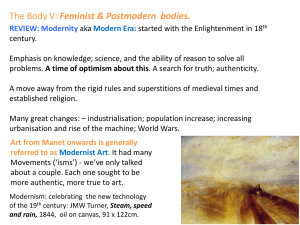Ingres/VectorWise Implementation Details
advertisement
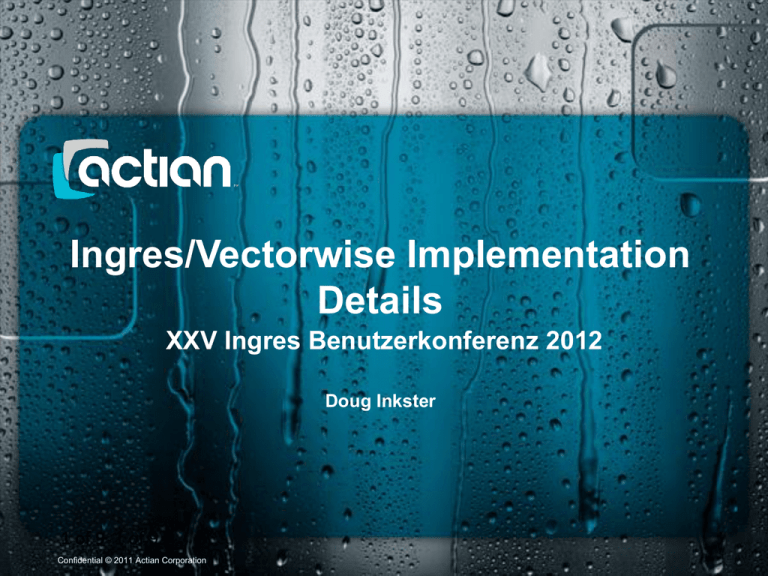
Ingres/Vectorwise Implementation Details XXV Ingres Benutzerkonferenz 2012 Doug Inkster 1 of 9 1 of 9 Confidential © 2011 Actian Corporation Abstract This session investigates the interface between Ingres and Vectorwise in more detail. It describes changes made to Ingres to accommodate Vectorwise and changes made to Vectorwise to accommodate Ingres, as well as specific features of Vectorwise and how they are exploited from Ingres. Confidential © 2011 Actian Corporation 2 of XX Contents • • • • • • Ingres/VW overview In Ingres, not VW In VW, not Ingres Ingres/VW coordination Clever VW features and their exploitation Coming VW features Ingres/Vectorwise Overview • Queries arrive in Ingres server, processed (as needed) by VW server, as well • Tables defined in Ingres catalogs as additional table type, but also in VW catalog • Select/update/delete compiled in OPF, passed by QEF to VW server as VW query • Insert/copy compiled in OPF, row images passed by QEF to VW server Ingres/Vectorwise Overview • VW algebra • Generated by optimizer’s cross compiler • Nested operators: Project, Select, TopN, Window, Sort, Aggr, OrdAggr, Mscan, MergeJoin1, HashJoin01, HashJoinN, CartProd • Trace point op207 displays compiled query – use x100pp to format it Sample VW query “select r_name, n_name from region, nation where r_regionkey = n_regionkey order by r_name” generates: Sort ( Project ( HashJoin01 ( MScan ( _nation = '_nation', [ '_n_regionkey', '_n_name'] ) [ 'est_card' = '25' ] , [ _nation._n_regionkey ], MScan (_region = '_region', [ '_r_regionkey', '_r_name'] ) [ 'est_card' = '5' ] , [ _region._r_regionkey ], 0 ) [ 'est_card' = '25' ] , [_region._r_name, _nation._n_name] ),[_region._r_name] ) OP207/x100pp • “set trace point op207” displays VW syntax, X100pp makes it readable Sort (Project (HashJoin01 (MScan ( _nation = '_nation', [ _n_regionkey', '_n_name‘]) [ 'est_card' = '25' ] , [ _n_nation ._n_regionkey ],MScan (_region = '_region', [ '_r_regionkey', '_r_name‘]) [ 'est_card' = '5' ] , [ _region._r_regionkey ], 0) [ 'est_card' = '25' ] , [_region._r_name, _nation. _n_name]), [_region. _r_name]) in Ingres, not VW • Statistical aggregate functions (standard deviation, variance, regression, correlation) • var_pop(x) defined in standard as: (s2 – s1*s1)/n/n – where s2 is sum(x*x), s1 is sum(x) and n is count(x) • OPF rewriter replaces var_pop() function with expanded formula – same for other statistical aggs in Ingres, not VW • Vectorwise has no equivalent to Ingres SEjoin for handling difficult subqueries • New flattening algorithms used e.g. “select * from p where pno >= all (select pno from sp where qty = 100)” is flattened to “select * from p, (select max(pno) as mpno, count(*) as cnt, count(pno) as cpno from sp where qty = 100) x where (p.pno >= mpno and cnt = cpno) or cnt = 0” in VW, not Ingres • “derived” notation in aggregate grouping e.g. “select custname, count(ordno) from customer, orders where custno = o_custno group by custno, custname” generates “… Aggr(…, [custno, custname DERIVED], [x = count(ordno)]), …” • Ingres now tracks functional dependencies based on key constraints (primary, foreign key), equijoins, aggregation groupings, etc. • Cross compiler determines applicability of DERIVED Not in VW, not in Ingres • GROUP BY enhancements: rollup, cube, grouping sets (new in 3.0) • Defined in SQL standard using UNION • SELECT … GROUP BY CUBE (a, b) transforms to: SELECT … GROUP BY a, b UNION ALL SELECT … GROUP BY a UNION ALL SELECT … GROUP BY b UNION ALL SELECT … GROUP BY () • The transformation is handled entirely in the optimizer rewriter phase • Works in VectorWise with no changes to VW • Works for native Ingres with no changes to query execution facility Ingres/VW Coordination • Some features involve both Ingres and Vectorwise changes e.g. “select …, rank() over (partition by sno order by qty) as qrank …” generates: … Project( Sort( Mscan(‘sp’, [‘sno’, …, ‘qty’] ), [sp.sno, sp.qty] ), [TRSDM_0 = diff(sp.sno), TRSDM_1 = rediff(TRSDM_0, sp.qty), …, qrank = sqlrank(TRSDM_0, TRSDM_1)] ) … Ingres/VW Coordination • Vectorwise REUSE capability • OPF identifies fragments of query appearing in multiple places (in UNIONs, in subqueries, …) • Common fragment builds separate query plan component • Vectorwise query caches initial instantiation of fragment • Subsequent references to fragment processed against cached rows Ingres/VW Coordination “select s_acctbal, s_name, p_partkey, p_mfgr, s_address, s_phone, s_comment from part, supplier, partsupp where p_partkey = ps_partkey and s_suppkey = ps_suppkey and ... and ps_supplycost = ( select min(ps_supplycost) from partsupp, supplier where p_partkey = ps_partkey and s_suppkey = ps_suppkey)” Project ( HashJoin01 ( As ( IIREUSESQ6 = Project ( HashJoin01 ( MergeJoin1 ( MScan ( _partsupp000 = '_partsupp', [ '_ps_suppkey', '_ps_partkey', '_ps_supplycost', '__jpartsupp'] ... ), __VT_6_1_3_1 ), [ __VT_6_1_3_1._p_partkey, __VT_6_1_3_1._ps_supplycost ], As ( Aggr ( As ( IIREUSESQ6, __VT_6_0_3_2 ... Clever Vectorwise Features • Compression – data compressed using variety of techniques (type and value distribution dependent) • Kept compressed in buffers • Only expanded when being processed by query operators Clever Vectorwise Features • Even non-indexed columns max/min values stored with each disk block • Restrictions are applied at the block level e.g. … where l_shipdate between date’2009-01-01’ and date‘2010-06-30’ … – will only read blocks with at least 1 row in the restricted range – clustering lineitem rows on o_orderdate effectively clusters on l_shipdate, too Coming Vectorwise Features • Just in time compilation – select portions of query for compiling into executable code – Project(), other operators computing expressions – Single call to compute entire expression, not one per operation • Cooperative scans – Scan scheduler tracks different queries requesting scans on same tables/columns – Single scan shared by multiple executing queries Coming Vectorwise Features • Additional compression techniques • Clustered Vectorwise • New indexing techniques • Intern program shared with CWI Summary • Exciting present • Promising future

